100 Seasons





















































When Boston College men’s hockey made the move in 1917 to turn what had been an informal group of hockey players into an official program, the team stepped into a fledgling world of college hockey. BC kicked off what would become a legendary rivalry with Boston University with a win in the early season, but the program struggled in its opening years and finished above .500 just five times between 1918 and 1929. Much has changed since those early struggles with poor play and stoppages caused by the Great Depression and world wars, as BC enters its 100th season with a storied legacy in the upper echelons of college hockey. The Eagles won their first National Championship in 1949 and, after a 50year drought, got back on top in 2001 before stringing together another three titles in the next decade. With a team chock full of senior leadership and a host of new faces, BC enters the new season with the same goal as always, but this time with an extra level of significance: to bring home the hardware in its centennial season.

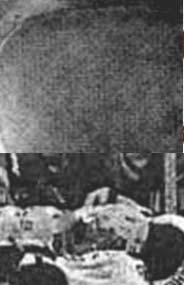





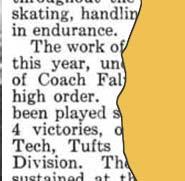


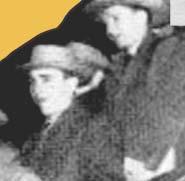




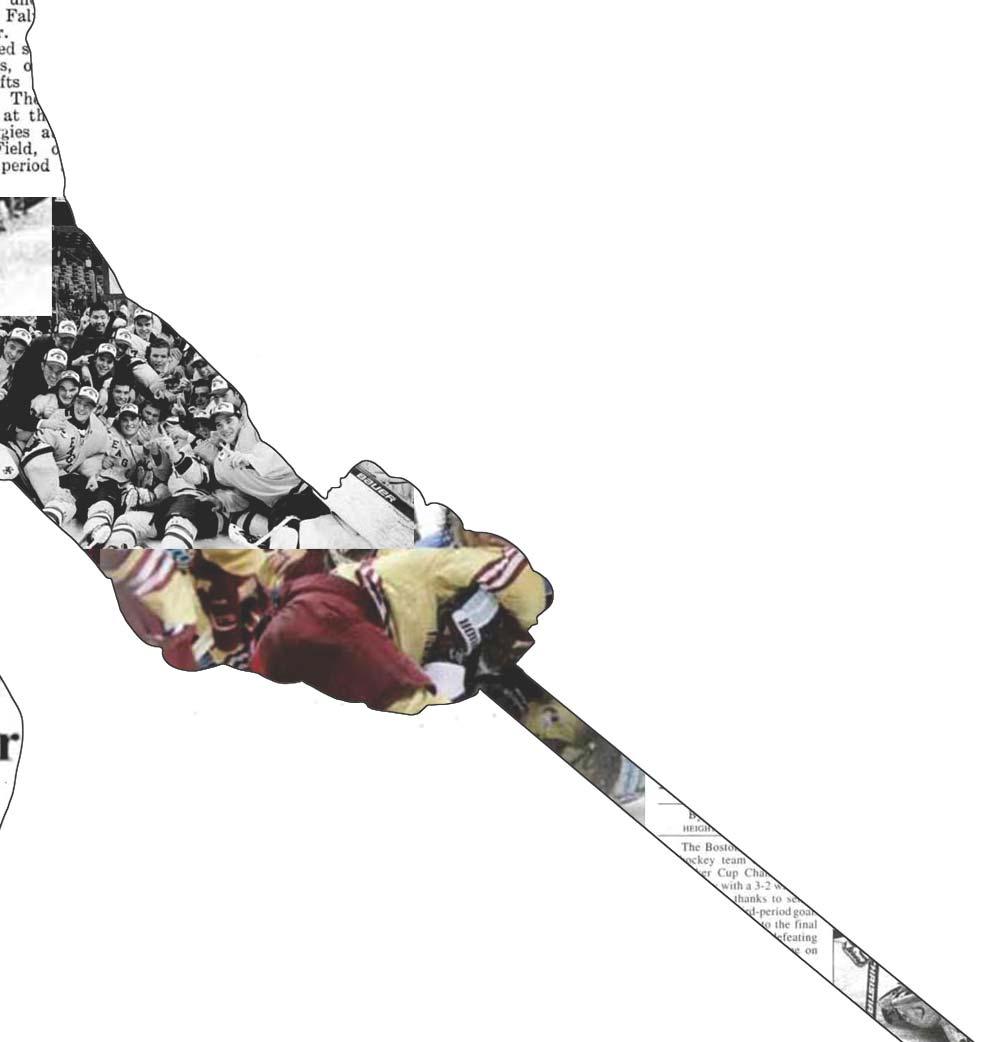

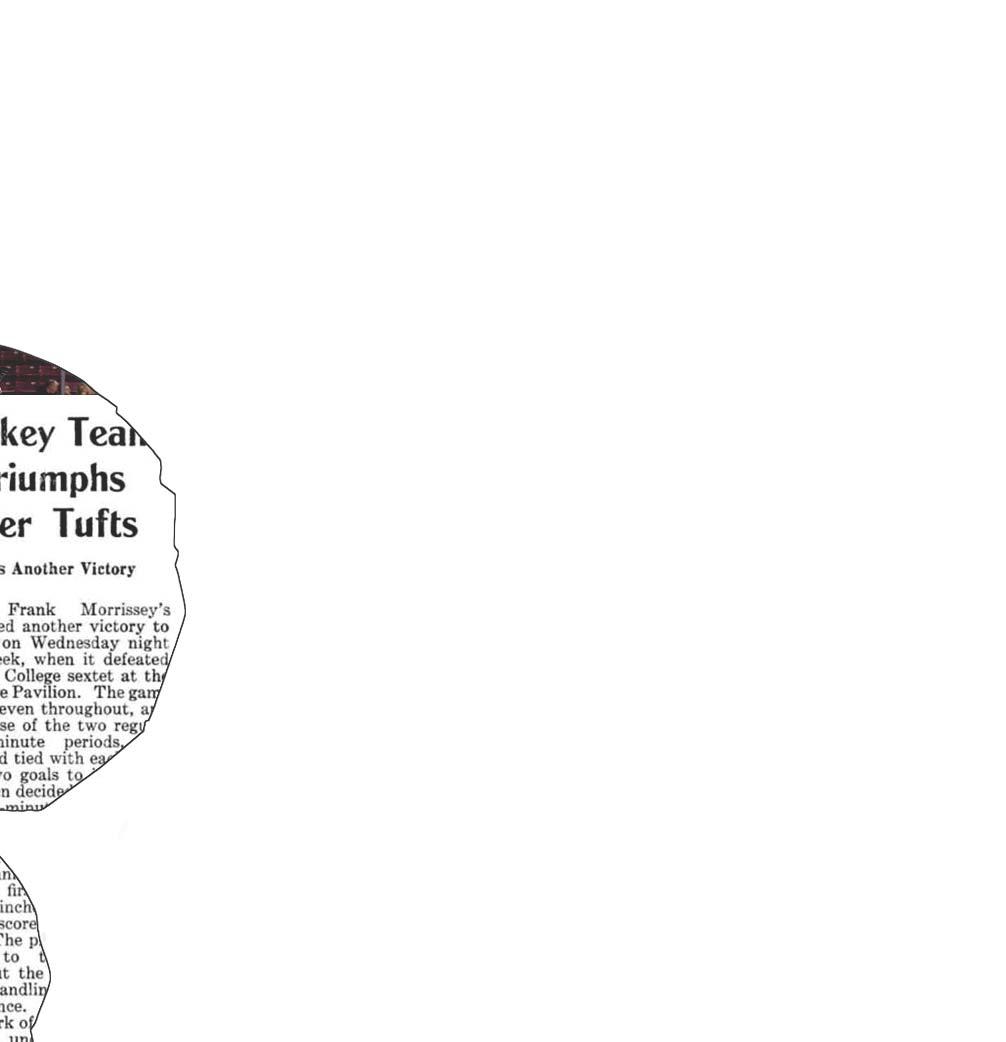
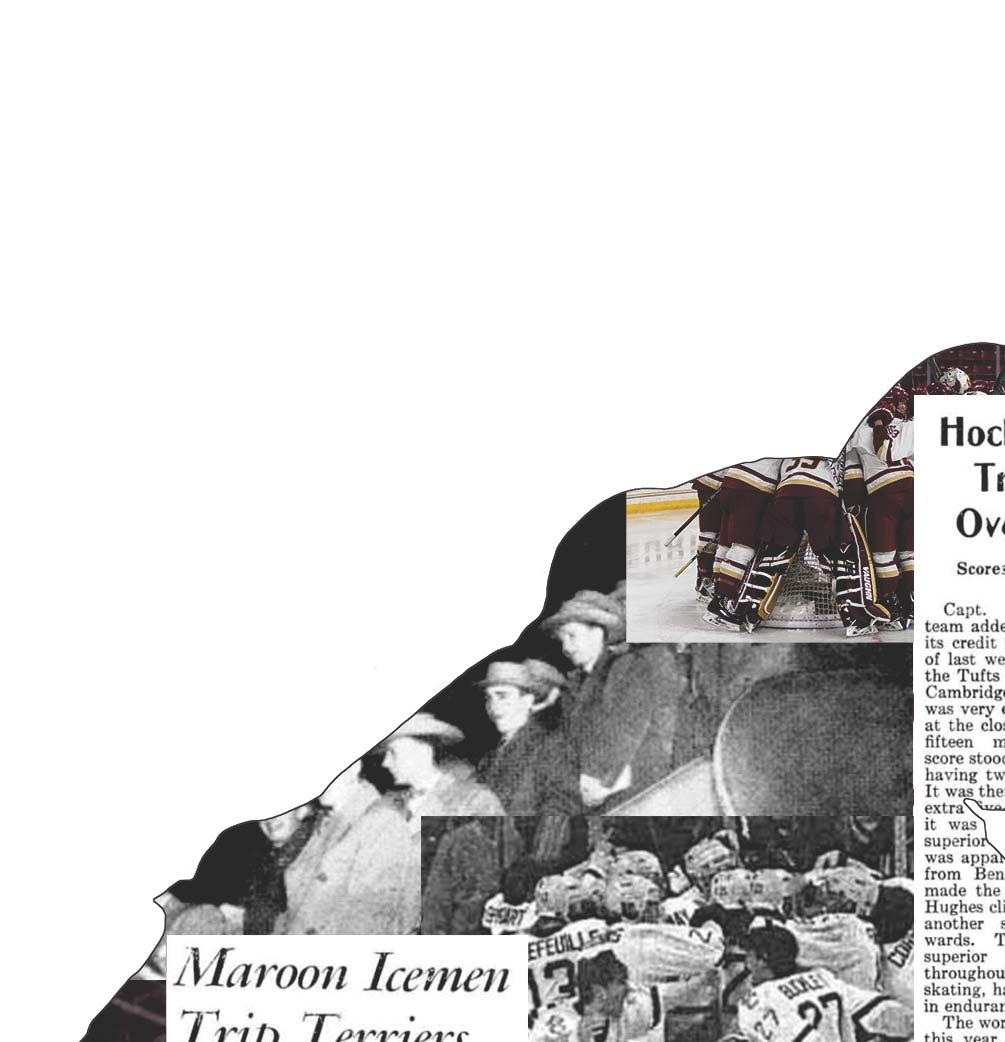

Tuesday, October 12, 2021 www.bcheights.com Chestnut Hill, Mass. INSIDE THIS ISSUE
100 SEASONS.......... MARC MCLAUGHLIN... BROOKS ORPIK.......... 2011-2012 SEASON..... NIKITA NESTERENKO... PAGE 2 PAGE 4 PAGE 5 PAGE 6 PAGE 7 Later
TURN OF THE CENTURY
BY EMMA HEALY Sports Editor
Fred Kinsman earned his varsity sweater for Boston College men’s hockey as a sophomore in 1964. At the time, students had to wear sport coats and ties to class, but the pride Kinsman took in wearing his varsity sweater was strong enough to get him to bend the rules.
The instant he took his seat donning his newly minted varsity sweater in marketing class, though, the professor pointed Kinsman out of the crowd.
“Mr. Kinsman,” he said. “Stand up. You don’t wear the varsity sweater in my class.”
Begrudgingly, Kinsman, BC ’67, swapped his maroon and gold for a black sport coat and sank back down in his seat. Still, his pride remained.
There’s something about BC hockey that makes its players stand a little taller and play a little harder.
“It is the players, the culture, the standard of excellence that pushed each and every one of us to want to be the best at our craft,” David Emma, BC ’91, said. “The opportunity to compete and play alongside so many tremendous players is why BC produces so much talent.”
It helps that BC has had 99 seasons to develop that culture. The puck drops on BC’s 100th season this week, making it one of the most historic programs in the country and instilling in players both past and present a sense of unbreakable pride. A century of hockey, producing five National Championships, countless professional players, and some of the greatest moments in collegiate hockey history, has the power to do just that.

Finding Its Wings (1917–1940s)
In BC’s first season, it was one of just 11 collegiate hockey programs in the country. The team had existed informally for 20 years prior, but under head coach Robert Fowler, BC set out to write what would become an epic of college hockey history. The Eagles—a nickname the team didn’t go by until The Heights suggested it in 1920—went 2–1 in their inaugural season, but only one of those games came against a collegiate opponent: a 3–1 win over Boston University, setting the stage for nearly 100 years of crosstown rivalry.
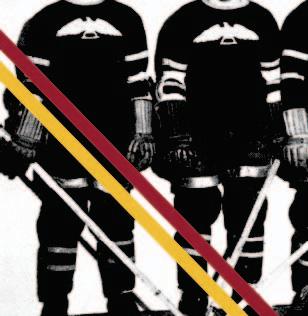
After the first season, however, it took the story a few chapters to get going. Between 1918 and 1929, BC finished above .500 just five times. The Eagles had established a fledgling national presence, but it was still miles—
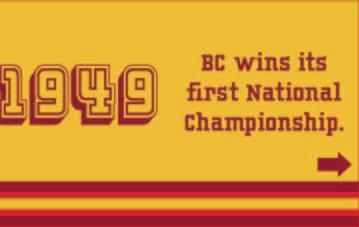

and decades—away from reaching the glory days.
So when the 1929 stock market crash and ensuing Great Depression rocked the country, BC was left with no choice but to scrap the hockey team.
But what is a winter in New England without hockey? A short four years later, BC hockey made a less-than-triumphant return.
“After the close of the football season, a group of students intensely interested in hockey, and not wishing to look forward to a winter of athletic inactivity at the Heights gathered together to discuss plans for the revival of the winter sport at a college which has produced some of the most famous names in intercollegiate hockey history,” read a Heights article from January 1933.
The group of students persuaded the BC administration to bring hockey back to the Heights, and John “Snooks” Kelley, having played at and graduated from BC just three years earlier, agreed to coach. Kelley steered the Eagles in the right direction, finishing above .500 in every season but one in the first 10 years of his tenure.
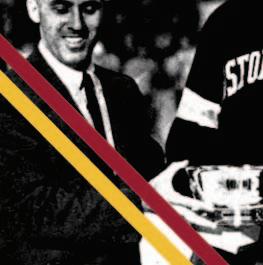
But just as had happened the last time BC hockey began to gain traction, a major world crisis put a halt to its progress. Kelley temporarily gave up his coaching duties in 1942 to enlist in the
Kelley’s return became all the more triumphant when he brought with him the hopes of a National Championship. In 1948, the Eagles took their first trip to the Frozen Four, falling 6–4 to Michigan in the national semifinal. Though BC returned to Chestnut Hill without any hardware, Kelley and his team had set a precedent.
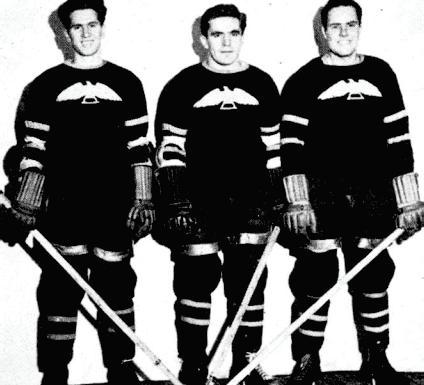
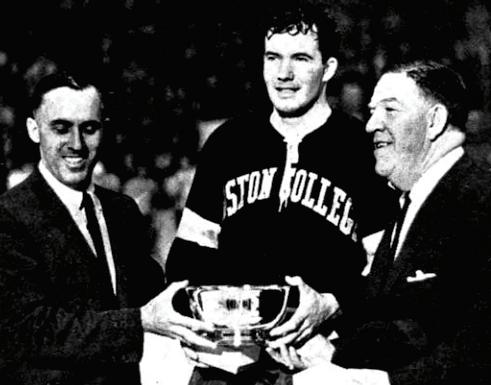
The next year, they made a return trip to the Frozen Four, this time besting Colorado College in the semifinal. After leaving the state of Massachusetts just three times in regular-season competition and heading into the postseason with a gleaming 17–1 record, BC looked unstoppable. The Eagles took home the title in the Northeastern Tournament, a precursor to the Beanpot, before taking on Colorado College. One day later, the “Kelleymen,” as The Heights dubbed the 1948–49 Eagles, narrowly edged out Dartmouth 4–3 in just the second NCAA Tournament of all time.
“The greatest ovation ever unloosed for the benefit of a national collegiate champion was given [to] the Boston College Hockey team when it alighted from the United Air Lines giant DC-6 Mainliner at 7:30 last Sunday evening,” said a Heights article following the team’s return to Boston.


But what the Eagles didn’t know at
Around that time, however, a few now-legendary names began to appear on the roster. BC was no longer a commuter school as it had been during the earliest days of the hockey program, but its roster remained New England–heavy.
“When we played … the only person on the team from out of state was Jimmy Mullen from Rhode Island,” Kinsman said with a chuckle. “It was all local players, you know, Melrose, Arlington, Norwood, Walpole, you know, Swampscott, Marblehead. It was all local kids.”
The same cannot be said for today’s team, as BC’s 2020–21 roster features two players from Ohio, two from California, and two from Canada. Recent BC rosters have also featured skaters out of Sweden and Finland, among others.
During his tenure, Kelley was known for his unconventional recruiting tactics, in which he would go up to high school players on the Boston Globe All-Scholastic list and ask them “What are you doing next year?”
“That was one of the bigger great moments for myself at Boston College,” Kinsman said.
That year, the Eagles won the ECAC and made yet another trip to the Frozen Four. There, BC upset North Dakota in the semifinal round before falling to Michigan Tech in the title game, leaving the 1949 banner alone in the rafters for yet another year.
After falling to Michigan Tech, BC began an unprecedented slide. By the time the 1970–71 season rolled around, BC had fallen below .500 for the first time since 1945–46, when the Eagles played just three total games and lost two of them.
A Familiar Face Returns (1972–1992)
As what looked like a drought in the Eagles’ success began, BC called on a familiar face, one who knew how to win at BC. And who better than a member of the 1949 National Championship team?
U.S. Navy during World War II, where he stayed until 1946. The Eagles went on hiatus during the war from the end of the 1942–43 season until the beginning of the 1945–46 season. Kelley returned one year later, and without missing a beat, the Eagles were back on track.
The National Stage (1949–1965)

the time, after their first taste of national glory, was that they would face a 50-year drought. BC made four more trips to the Frozen Four over the next 12 years, but the semifinal round became its kryptonite.
Perhaps it was an attempt to break the pattern, or perhaps the Eagles
One of the beneficiaries of that question was Jerry York, a product of BC High. After his freshman season on the Heights, Kelley called York, BC ’67, up to varsity, where he steadily became a stalwart of the Eagles’ rotation, and by the end of the season, had become a bonafide hero.
It was in that National Championship game that then-sophomore Lenny Ceglarski, later known as Len, began to make a name for himself. His second-period goal put the Eagles up 3–2, before they went on to win 4–3
2 THE HEIGHTS | OCT. 12, 2021 100 SEASONS | HISTORY
wanted to expand their national presence, but prior to the 1961–62 season,
BC made the move from independent to join the Eastern College Athletic Conference (ECAC). If the former was the goal, the conference move made no difference in BC’s national tournament success, as the Eagles once again fell in the NCAA Semifinal the next year.
In overtime of the tournament’s first round against Harvard, Kelley opted to
start his sophomore line—dubbed “the kid line” by Jocko Connolly, longtime writer for The Boston Herald—featuring York and Kinsman. The pair broke out on a 2-on-1, and a quick fake from Kinsman sent Harvard defender Bobby Clark the wrong direction, and he posited the puck to York for a quick finish.
COURTESY OF BC ATHLETICS
COURTESY OF BC ATHLETICS
One hundred seasons later, BC men’s hockey can celebrate a century of nearly unbroken success.
See 100 Seasons, A3
rsk ski i’ ’ s i biggest t mo move ve at t thhe h heelm lm was as to o ov overseee b a jump froom m thhe e EC C A AC to H Hoockey y Eaasst when the coonfefereenc n e first st beeggan in 199884 4 w Th at m ov v e pa a id d o ff f for the E ag gl es s e , a as s f ro m 1 19 84 4 to 19 92 9 2 , BC C too o o k a tr ip to o t th e N NC A AA Toou r n rn am m ennt si x t imes an d f inish e d f irst in Hocke y East in a ll six o f th ose seasons Lea d ing th e ch arge in BC’s earl iest d ays as a mem b er o f Hocke y East was Emma, w h o was name d to th e A ll -Hockey East Roo k ie Team i n 1987–88.
“ I trie d to p l ay every game l i ke it was th e l ast game. I never too k one g ame for grante d,” Emma said of his rook ie season. “I always felt like you h ave to earn respect each an d every nig ht. This was the culture I trie d to b ui ld at BC in my four years.”
R espect appeare d to come easi l y f or Emma, as b y t h e time h e was a senior, Emma was BC’s a ll -time leading scorer with 239 points (112 g oals, 127 assists) across his four y ears. A f ter l ea d ing th e Eag l es with 35 goa l s an d 46 assists h is senior year, Emma b ecame the Eag les’ f irst Hob ey Baker Award winner, honoring the b est collegiate hockey player i n th e country.
Winning the Hob ey Baker was a huge excl amation point to my time at BC, b ut I wou ld h ave given anyth ing for a Nationa l C h ampionsh ip, or a Beanpot [ title ] ,” Emma said
As ta l ent- l a d en as BC’s roster was at t h e time—t h e team t h at prece d e d Emma’s f res h man year pro d uce d seven f uture NHL p l ayers—th e el usive Nationa l C h amp ionsh ip remaine d just out o f reach Th at’s not to say th at BC was without support or wit h out b ig wins d uring Emma’s career. In f act, th e opposite was true.

D uring the 1989–90 season, Emma’s junior year, th e Eag l es h oste d Minn esota in a best- of - th ree se ri es d urin g t h e NCAA Tournament. A f ter sp l ittin g th e f irst two g ames, Emma score d t w o secon d s into th e th ird g ame o ff th e openin g f aceo ff en route to a 6–1 win, earnin g a trip to the Final Four. Conte Forum, built




two years of interim coaching following Ceglarski’s retirement, BC finally found its ticket to the promised land in the form of York.
It’s h ard to k now i f C h et G l a dchu k , Jr., th e athl etics d irector at th e time, k new t h e gravity o f t h e h ire w h e h a d just ma d e. He d i d n’t k no th at York wou ld l ea d h is team to 11 Hoc k ey East regu l ar season tit l es (or, 11 so far ) . He didn’t know that York wou ld b ecome th e winningest h ockey coach in NCAA h istory. He d i d n’t k now th at York wou ld d el iver four Nationa l C h ampionsh ips in h is f irst 20 years at the helm. How could h e h ave ?
A ll h e h a d was Yor k ’s trac k r ecor d . Seven years at C l ar k son an d g 15 at Bow l ing Green—inc l u d in one Nationa l C h ampionsh ip at th e l atter—h inte d at greatness to come.
The immense scale of that greatness, however, would b e unveile d over the next th ree d eca d es
A f ter accepting h is d ream jo b at h is a l ma mater, York h it th e groun d running. It took three seasons for the Eag l es to ma ke th e NCAA Tourn ament un d er York , b ut in th e spring of 1998, the Eag les b egan to see what was to come.
In 1998, th e Eag l es fell in th e National C hampionship. The next year, th ey l ost in th e nationa l semi f ina l an d th e year a f ter th at, th ey l ost in the National C hampionship again. It was on l y a matter o f time b e fore th e trop hy returne d to C h estnut Hi ll
Th e next year, th e 2000–01 se ason, th e story b egan to write itself
An a ll -star roster f eaturing Brian k Gionta, Broo k s Orpi k , an d C h uc Kobasew, among others, propelled BC to its f irst re g u l ar season con fe rence titl e since York too k th e reins.

And the wins kept coming. BC won t h e Hoc k e y East Tournament in eff icient f ashion, earning an auto -
matic bid to the NCAA Tournament for the fourth time in as many years. Wins over Maine and Michigan sent the Eagles to the National Championship game, setting them up against North Dakota, which had devastated BC in the title game one year prior.
“It could’ve been a lot easier,” a Heights article following the game read.
But it wasn’t. Nursing a 2–0 lead in the third period, the Eagles watched their first National Championship in 52 years begin to slip through their gloves. Instead of BC cruising to victory, North Dakota forced overtime, and it took a sudden-death goal from Krys Kolanos to clear the benches and send BC home with hardware for the first time in five decades.
“That emotion, what happened that night, it fuels us,” York said. “I want to do this again. I want the same players, coaching staffs to experience the same thrill of that. Because there’s a lot of nights you don’t win, and to be able to have that, and bank that, is pretty important for us.”
Students back on the Heights fled from their residence halls and took to the mods, tearing down fences and throwing beer cans all the way, according to a Heights article at the time. Their celebrations were warranted, given the seemingly eternal nature of the drought that BC had finally ended.
“We had gone 50 years without winning a national title, and that [2001 title] was a breakthrough that clearly helped us win the next three here at BC,” York said. “But the first one’s always difficult.”
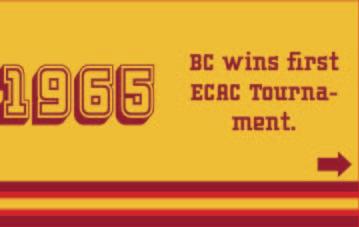
Suddenly, the floodgates were open. York and the Eagles won three
“It’s not part of my fabric, it’s not part of my makeup,” York said after that milestone win. “You leave your ego at the door. You’re a family.”
In the nearly three decades since York was named the Eagles’ head coach, he has produced two Hobey Baker Award winners (Johnny Gaudreau in 2014 and Mike Mottau in 2000), one Mike Richter Award winner (Thatcher Demko in 2016), one Tim Taylor Award winner (Alex Newhook in 2020), and countless other individual award winners and professional players.
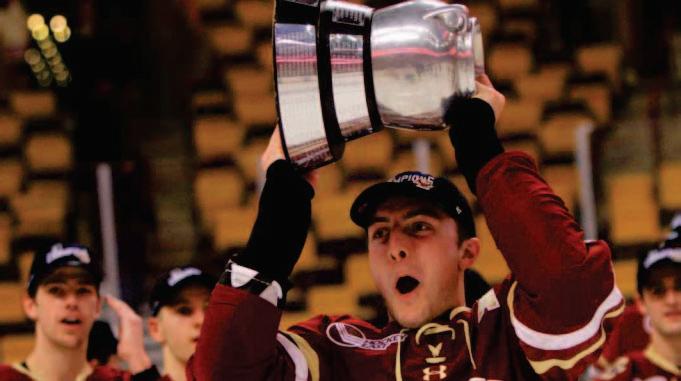
college hockey has become a stepping stone, rather than a destination. Many players have an NHL roster spot awaiting them before they even set foot on the Heights, and York largely expects to only have his best players for two or three years.
“I think when he recruits them he’ll sit down with these guys and say ‘I’ll understand if you want to leave after two or three years,’” Kinsman said. “‘But I hope you don’t leave, because that next step could be that National Championship.’”
ovver e Dar a tmmouth C Ce l gl g ar k ski i retturned to o thhe e Heeigghhtts in 1 199772 as s BC C B ’s s heeaad c cooacach af a ter K Keelllleey ’s rettireemmennt Hi His s 20 2 -yyeaear r co coaacching caarreeer r w a s o on n e of o t he e m os s o t t tr r a an s f or r ma a m t ti i ve t st s i intts in B BC C histtory, a as the h Eagaglees s m maadde nine triips ps to thhe e N NC C AA AA Touourrnnamament t in that t span a But t pe e p rhhaap p s Ce egl g a ar
ju st o ne e y ea r pr r io i r, r w as roocki i ng “S Stu de nt n s a an d f a n ns s to t rm ed thhe ice af f t teer the e huge win i , a and Bill Guuerin g raabbb ed a hug g e B BC C f la g an d wa w s sk s at in n g a arou u nd n d th e i ce c i n ce el lebbr at i on n , ,” E mm a sa id “ The atm m t os s ph er e e that n ig ht t w as a s p r ro babl y o on e of o f the h mo o st s i nc n c r re e d di bl e y expeeri r ienencce e s o of any nighht t at a B C C.” The Th Prroomi m sed La L nd d (1 (19994––presennt) ) ho ug g h Ce C e g gl ar sk i’ i s te e nure roockkeetted BC C even n further into th t e straattossphere e the program f wa s r raappi dl l y a ap p p proa a ch in n g 50 0 y ea rs o N
naal Chaammppionsshiip p drought.
Nation
Afteer
100 Seasons, from A2
ATHLETICS “I ALWAYS FELT LIKE YOU HAVE TO EARN RESPECT EACH AND EVERY NIGHT.” — David Emma THE HEIGHTS | OCT. 12, 2021 100 SEASONS | HISTORY 3
COURTESY OF BC
“A DIFFERENT BEAST”
BY ETHAN OTT Asst. Sports Editor
Boston College men’s hockey forward Marc McLaughlin has been a captain at every level he’s played at—his teammates at BC have elected him captain two seasons in a row. For McLaughlin, leadership comes as naturally as hockey.
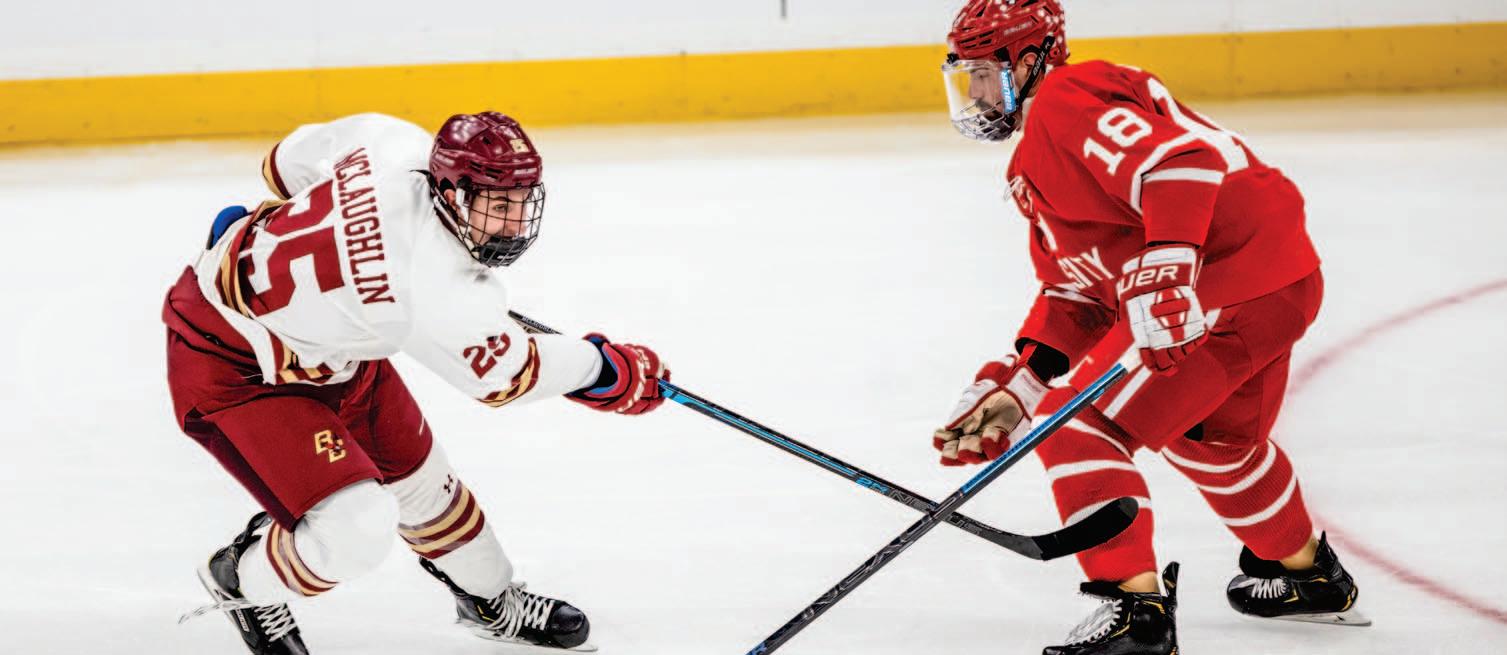
“People gravitate toward him—he’s a natural leader,” BC head coach Jerry York said. “He works hard and sets a great example. … There’s an intrinsic quality about him where I want this guy as a leader.”
McLaughlin has seen his fair share of success in a BC uniform. He’s scored five game-winning goals, won the Hockey East Best Defensive Forward award, and won the Bernie Burke Outstanding Freshman Award.
A highlight reel and list of McLaughlin’s accomplishments during his time at BC wouldn’t show the complete picture. It couldn’t show his leadership on the ice and in the locker room, or how he inspires younger players with his behavior and work ethic. It would, however, be full of great moments on the ice that are inspirational enough even without the context of his leadership.

One such play came last January in an overtime game against New Hampshire with the Eagles down a player.
“You’re going into overtime killing a penalty and [McLaughlin] scores a short-handed goal to win it,” York recalled. “With three seconds left we took a penalty—tie ballgame. Now we’re going to be short for the first two minutes of OT and that breakaway goal was exciting.”
When the BC men’s hockey Twitter account posted the video of McLaughlin’s game-winner, it didn’t point to his individual effort. Instead, it read, “This guy wears a C for a reason,” referencing the captains’ patch sewn onto the front of his sweater.
As capable as he is of stepping up in big moments, McLaughlin’s biggest contribution to his team comes when the cameras aren’t rolling. Surprisingly, the UNH game-winner does not earn the spot
of McLaughlin’s favorite moment as an Eagle. In fact, his most cherished memory has nothing to do with his individual success.
“When we won the regular season the past two years in a row now … that was special,” McLaughlin said. “To see how hard we worked and to have a little bit of success—that’s probably my favorite moment so far.”
In his three years as an Eagle, McLaughlin has tallied 44 points on 19 goals and 25 assists. Along with his aforementioned awards, he was selected as a Hockey East Third Team All-Star after his junior season last year and was a runner-up for the Len Ceglarski Individual Sportsmanship Award. In 2018—before he started at BC—McLaughlin was selected for the Curt Hammer Award, which recognizes a USHL player for outstanding performance skills, pride, and determination on and off the ice.
He was the captain of his high school and USHL teams before being voted BC’s captain for the last two years.
“He’s high quality, right through,” York said. “His family’s done a great job raising him. He’s a remarkable young guy.”
McLaughlin is the youngest sibling in a family of five. His dad, Walter, played high school hockey, while his sister Kristine and brother Sean played in college at the University of New England and Wentworth, respectively. Though his mother Jill was not a hockey player herself, Mclaughlin even credits her for teaching him to skate.
“I’m the youngest in my family, so I look up to all of them,” McLaughlin said. “They’re all involved in sports. How hard they work and how genuine they are as people—they’re really inspiring. I turn to them a lot in my life for guidance and they’re always supporting me. They’re definitely my role models.”
Though he comes from a hockey family, McLaughlin was never able to play with his siblings due to age differences. Instead, he had to look up to older players on his team for guidance on the ice—a role he now fills for younger players.
“As soon as I got here my freshman year I remember seeing Casey Fitzgerald,
Michael Kim, and Chris Brown,” McLaughlin recalled. “Seeing how hard they work, how seriously they took everything, and how professional they were, and how they carry themselves off the ice—that’s the stuff that I learned immediately and started to replicate. … They definitely paved the way for me.”
Today, McLaughlin mirrors a similar style of leadership. Rather than actively coaching younger players, he lets his actions speak for themselves and hopes others will follow.
“My leadership style is to just lead by example, do the little things the right way, and compete as hard as I can,” McLaughlin said. “[I try to] be a good role model and set the standard for the younger guys so when they get to be a junior or a senior they’re hopefully doing the same things and competing and leading by example and creating the path for that next wave.”
For as humble as McLaughlin is, York makes clear just how important he is to the team.
“He is just a terrific role model for all our student-athletes,” York said. “He’s very conscientious about school [and] diligent about hockey requirements. … He’s a guy you want to get behind and follow.”
McLaughlin’s teammates are following him to what they hope will amount to an NCAA Championship run, but a group of high schoolers follows McLaughlin for a different reason.
“I coached a youth team in some summer tournaments—that was pretty fun,” McLaughlin said. “It’s a different perspective for sure. I was coaching 15-yearolds, and it’s cool to give back and give my perspective of the game. Hopefully they can learn some stuff. … We made it to the finals one weekend.”
Despite being the sole member of his family to attend BC, McLaughlin always seemed destined to become an Eagle. He grew up in North Billerica, Mass. and kept an eye on BC hockey growing up. He said he attended Beanpots as a fan and played in camps at BC, but it was not until a USHL showcase that his destiny came to fruition.
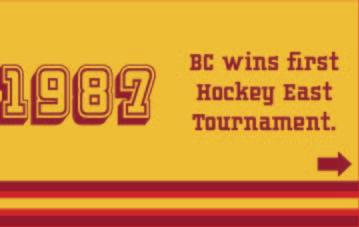
“As soon as [BC assistant coach Mike Ayers] asked me to come to BC, it was a no-brainer,” McLaughlin said. “Being a local guy, it’s everyone’s dream to play at BC. … It was a pretty easy decision.”

McLaughlin fell in love with the campus and school immediately, but it was not until he played in his first-ever collegiate game that he truly registered what the next four years of his life would hold.
“It was a packed crowd against Wisconsin, who was a good team that year, so it was an eye-opening first weekend of college hockey,” McLaughlin said. “That was where it hit me. … The kids were stronger and it’s just a different animal—a different beast.”
Three years later, McLaughlin has seen two regular-season championships and an abbreviated NCAA Tournament run. With all that he has accomplished already, there is still plenty more to be done in what could be his final season as an Eagle. McLaughlin has one year of eligibility remaining after this season, but what that year might hold is still unknown. Regardless of what McLaughlin’s future holds, the Eagles have their sights set on the upcoming season—and postseason.
“Losing in the NCAA Tournament to St. Cloud State hurt a lot,” McLaughlin said. “To grind all season to get to that point and then come up short—it’s definitely a learning experience. It’s gonna make us stronger going into this year and more motivated. … It definitely doesn’t sit well.”
Hockey is an emotional game, and McLaughlin recognizes the importance of balancing passion with level-headed play. Without dismissing the importance of success, McLaughlin also emphasized the importance of having fun.
“A big part of having a good team is
not getting too high, not getting too low, and having that even-keel mentality,” McLaughlin said. “We try to come to the rink and have fun every day … [while] pushing each other to get better.”
McLaughlin’s leadership comes from his actions, and his love of hockey is clear even from brief observation. He has undoubtedly gone through highs and lows during his time at BC, and it is obvious that he has mastered processing the lows while cherishing the highs.

“It’s super fun,” McLaughlin said. “We have the best group of guys—it’s a blast to come to the rink every day. … That’s how you get better. You show up and you’re with your best friends and you get to compete with them, and then you get out there in games and you want to play for that guy.
… It’s a pretty special culture that we have.”
BC’s 2021–22 season will be its first with fans back in Conte Forum since the middle of McLaughlin’s sophomore season. The Eagles build on the excitement of their audience, and this year’s McLaughlin-led team is capable of great things.
“You don’t get many chances to win a championship,” McLaughlin said. “You don’t get many stabs at an opportunity at the Garden to hoist the trophy. Don’t take those moments for granted.”
McLaughlin said he will cherish his last seasons in a BC uniform regardless of the outcome, but he—and the rest of the BC team—has his eyes on what the Eagles haven’t accomplished since 2012: a National Championship.
“We’re still chasing one here,” McLaughlin said. “Senior year—we’re hoping that this is the year we can pull it all together.”
4 THE HEIGHTS | OCT. 12, 2021 100 SEASONS | MARC MCLAUGHLIN
“ HE’S A GUY YOU WANT TO GET BEHIND AND FOLLOW FOLLOW.”
— Jerry York
Leadership is
in Marc McLaughlin’s
blood. As a
second-year
captain, he’s still got more to prove.
JESS RIVILIS / HEIGHTS SENIOR STAFF
F U L L C I R C L E FULL CIRCLE
BY NICK PULICE Heights Staff
Since head coach Jerry York took over in 1994, Boston College men’s hockey has been defined by a singular word: winning. In that time, the Eagles have earned a sensational total of four National Championships and nine Hockey East Tournament titles.
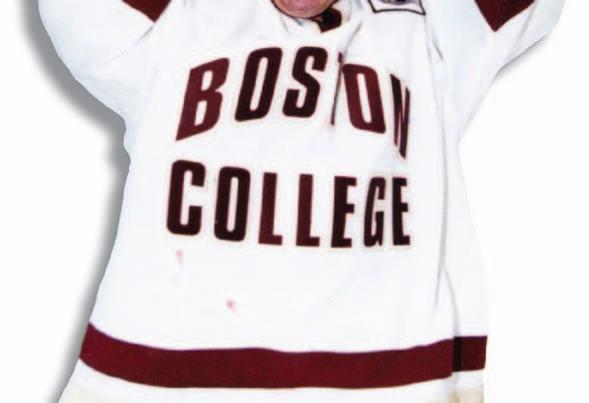
Prior to the 2020–21 season, York added another proven winner to his coaching staff: former Eagle Brooks Orpik. Orpik was a key stalwart on the BC blueline for three seasons from 1998 to 2001. He played a major role in BC’s 2001 NCAA Tournament victory, the Eagles’ first national title in over 50 years that kicked off the team’s 21st century dynasty.
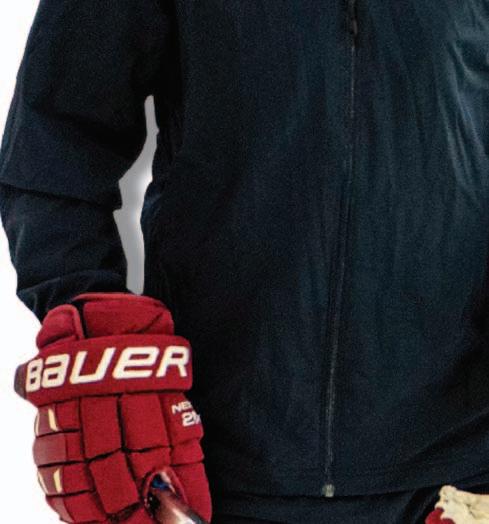
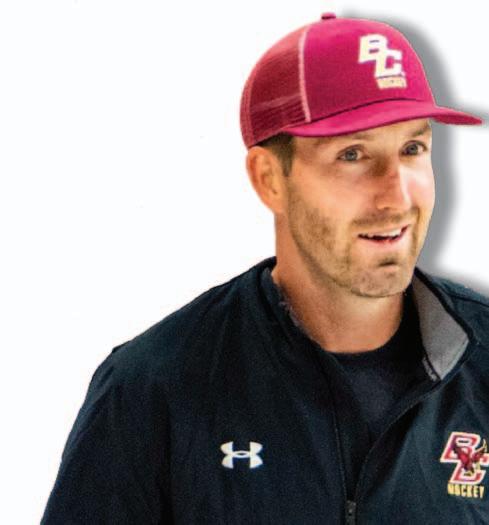
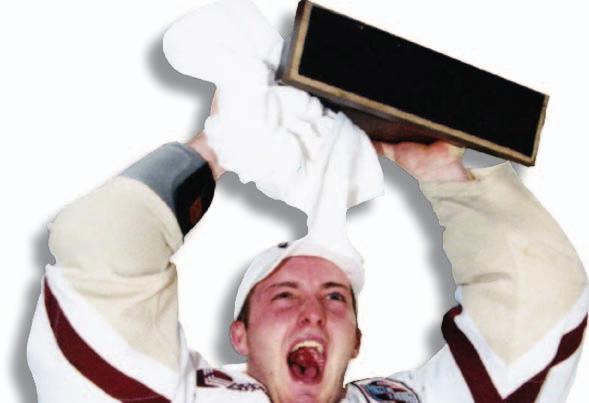
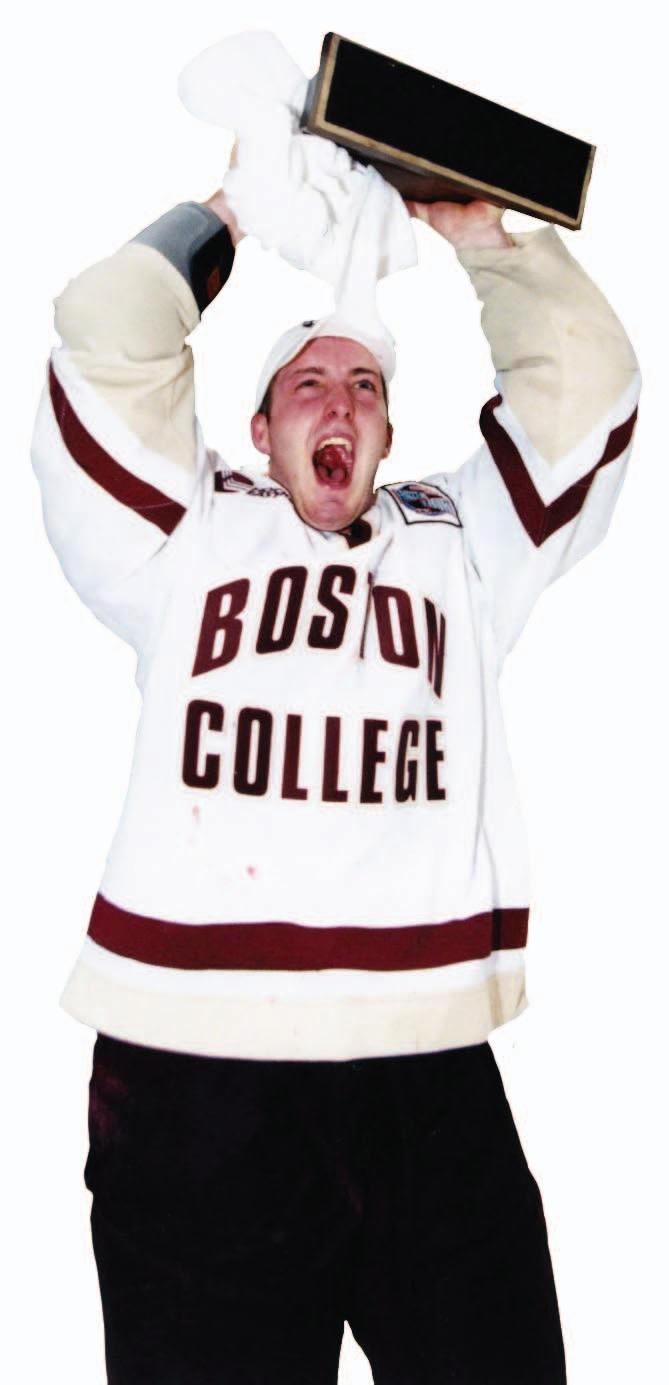
“[Orpik was a] really hard-nosed, physical, strong, and a tremendous skater,” York said. “Really good on his edges with outstanding balance.”
Orpik left the Eagles after delivering a national title to Chestnut Hill, and he went on to have an NHL career

for the ages. After being drafted in the first round of the 2000 NHL Draft by the Pittsburgh Penguins, Orpik finally made his NHL debut in the 2002–03 season. As a professional player, Orpik continued to put his defining characteristics on display: leadership, physical strength, and skating ability.


He played a crucial part in the Penguins’ Stanley Cup victory in 2009 and the Capitals’ first Stanley Cup win in 2018. Though he remained an imposing presence on the ice for nearly two decades, Orpik excelled even more off the ice. He spent many of his NHL seasons as an assistant captain and was nominated for the King Clancy Memorial Award, which recognizes leadership and community outreach.
Even though he may not have known it as a player, coaching hockey was destined to be a part of his future.
Orpik ended his illustrious NHL career by retiring at the conclusion of the 2018–19 season. At the time, he wasn’t entirely sure what post-

a year after his retirement.
“It was the perfect amount of work,” Orpik said. “It kept you in the game. Sometimes you just listen to the people around you that sometimes know you better than yourself. It’s been fun.”
With about a dozen credits remaining to earn his college degree—Orpik departed for the NHL after his junior year—his former college coach soon approached him to join his bench. It was a match made in heaven, according to York.
“We knew he was still four courses short of his degree, so we said come on back, and take your degree and work with our team,” York said. “He wanted to get his degree, and he likes to coach hockey.”
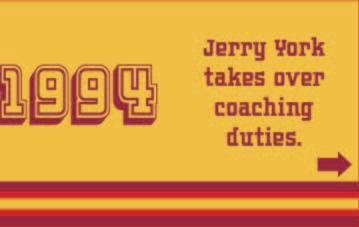
When asked about his coaching style, Orpik stressed being reserved and how his job with BC has been a learning experience for him.
“I try to interject when I can and try to be in sync with [the other coaches],” Orpik said. “I’ll try to give little pointers here and there that can help out the guys. I’m kind of just a guy that they can go to if they need extra assistance or have questions. They like asking me questions about guys I’ve played with and different experiences.”
Even in his first season in a new role for the Eagles, Orpik doesn’t come without experience. Though he may act reserved in practice, York said he knows how valuable Orpik’s experience has been to the squad. Defenseman Drew Helleson, fresh off a standout sophomore season, attributed a lot of his success to Orpik.
But as a two-time Stanley Cup champion, Orpik knows very well how top teams will often lose key members of their core and have to find a way to come back. Despite losing a significant number of players from last year’s NCAA Tournament-level team, Orpik said that he is not worried about this year’s roster.
He said that he believes the culture set in place here will keep the Eagles playing at the same high level that fans are accustomed to seeing. Even though they did not achieve their ultimate goal of bringing home a sixth National Championship, the Eagles finished atop Hockey East and were just a win away from a Frozen Four appearance.
“They’ve got a great group of seniors here this year and some good fifth-year grads coming over,” Orpik said. “It is a little bit different in terms of the pieces, but I think the culture and having that good standard in place is what keeps that going.”
Not only will this season mark the 100th season for BC, but it will also be the first

“normal” season of Orpik’s NCAA coaching career after a COVID-19-impacted opening campaign. As a 20-year veteran, he knows the effect that fans can have on gameplay, and Orpik said he’s looking forward to welcoming crowds back to Conte Forum with open arms.
“Just as an athlete, there are plenty of times where the schedule is really demanding, so you need some external motivation to fuel you, and that is where the crowd comes in, whether it be home or away,” Orpik said. “Even when you get booed, it gets you going. Everyone’s excited to have that atmosphere back.”
Now retired from playing professional hockey, with his wife and two young daughters at his side, Orpik has found his path forward by returning to what he knows best. Over 20 years after his BC debut, Orpik’s life has come full circle.
NHL life held for him.
Orpik was not quite sure if coaching was for him, but many of his closest friends and family encouraged him to try his hand at it. After some convincing, he took a part-time job with the Capitals’ player development team about
“When you have a guy like that who had such a successful career in the NHL and played under Coach York, I think it’s obviously something you can take advantage of,” Helleson said. “Whenever he’s talking, you’ve got to have your ears open because he’s been there and done that. He has accomplished everything you can as an NHL player.”
York added that Orpik has been an extremely player-friendly coach. Helleson said that he and his teammates have enjoyed all of the tales Orpik has told them from his playing days.
“[He would tell us] funny stories in the locker room about guys that we looked up to growing up like [Alex] Ovechkin, [Nicklas] Backstrom, and [Sidney] Crosby that he played with,” Helleson said.
There will be a lot of new faces on this year’s BC team. The Eagles lost the majority of their core with Alex Newhook, Matt Boldy, Mike Hardman, Spencer Knight, and Logan Hutsko departing for the NHL.
THE HEIGHTS | OCT. 12, 2021 100 SEASONS | BROOKS ORPIK 5
Brooks Orpik is no stranger to winning, with an NCAA Championship and two Stanley Cups to prove it. Now, he’s back on the Heights for more.
THE PROMISED LAND
BY MARIA O’DONNELL Heights Staff
Surrounded by memorabilia marking thousands of wins, photos of himself shaking hands with the president of the United States, and so many trophies he can hardly name them all, Jerry York admires just one photo.
The silver-haired hockey coach stands a short distance away from it, with his hands at his side, saying nothing. The placard at the bottom reads “Tampa Triumph,” and York gazes on at a moment frozen in time. A haphazard line of gold and maroon jerseys skates toward the goal, shedding their gloves and sticks as they go, and streamers hang motionless in the air.
“That sums it up for us,” York said after a long silence. “Just the banners and the excitement and the pure joy of the faces.”
They won 19 straight games. They won their last 11 games of the regular season. They won the Hockey East regular-season title. They won the Beanpot. They won the Hockey East Tournament. They won the National Championship at the Frozen Four. All York could do then—and all he can do to this day—was stand back and admire.
To say that the 2011–12 Boston College men’s hockey team was talented would be a drastic understatement. This spring marks the 10-year anniversary of BC’s last National Championship—the one dubbed the “Tampa Triumph”—that calls for reminiscing.
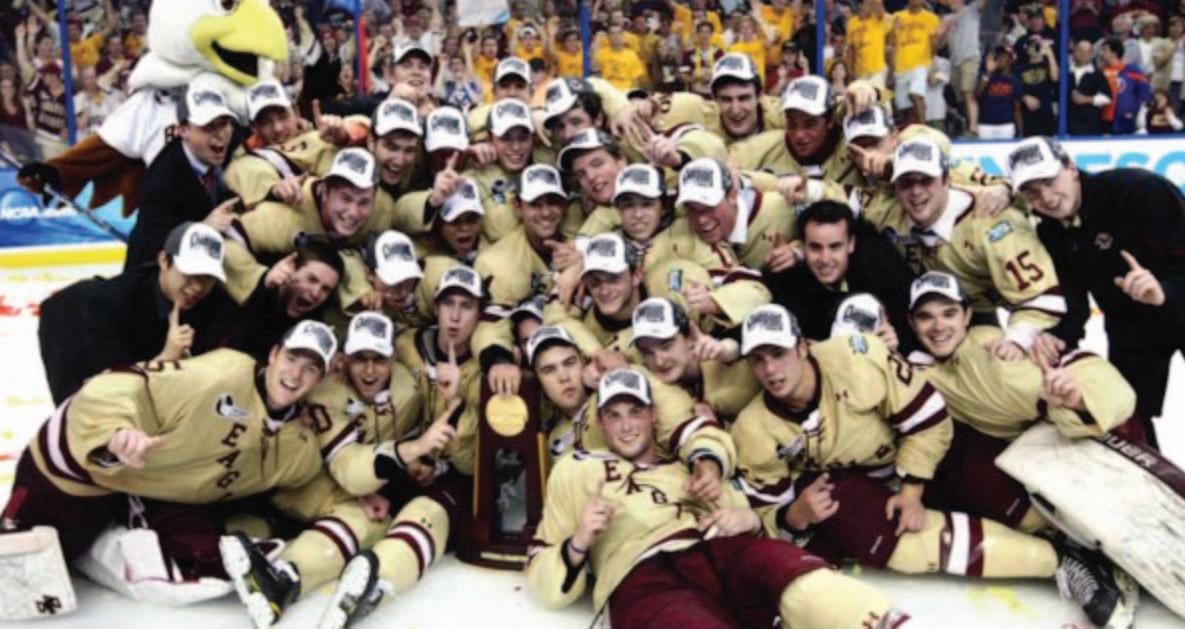

“I thought it was pretty magical,” York said. “You know, everything kind of broke well for us, and we took off. … It was a pretty amazing year for us.”
Any National Championship win is impressive, but what was especially impressive about the 2011–12 team was
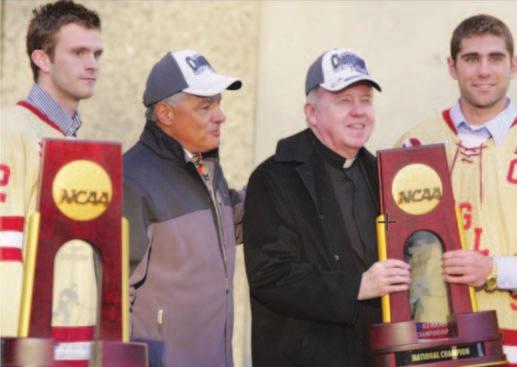
the way it arrived at its destination. After losing 10 of its first 25 games of the regular season, it looked like BC was going to be anything but special.
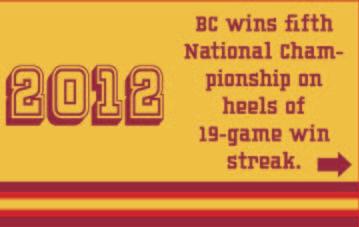
But midway through the season, something changed. Under the direction of starting goalie Parker Milner, the Eagles morphed into one of the most dominant hockey teams in BC history.
“We had a moment where we had to come together and we were able to do that,” Milner said.
Milner was a key part of the Eagles’ chemistry, starting 34 of the Eagles’ 44 games and winning 29 of those starts that season. He ended the season with a .937 save percentage, but his season was not always smooth sailing.
“I had had a little bit of a rough patch, and some of the other goalies were playing,” Milner said. “I went back in and just that whole run at the end of the season. It is hard to even think that we were able to accomplish that.”
Milner allowed just 57 goals in 34 games, recording five shutouts during the season. Once his spot was solidified as starting goalie, he became arguably one of the best goaltenders in the league.
“He just got red hot [as our] goaltender,” York said. “That’s sometimes like a quarterback that just throws all completions, no interceptions. To go that many games on a win streak, the confidence level was so good on that team.”
Two games into the Eagles’ win streak, they traveled to TD Garden for the annual Beanpot Tournament looking to win their third consecutive title. The chemistry was still forming for BC, which had just escaped with two close wins over New Hampshire.
The Eagles were paired with Northeastern in the first round of the tournament, and BC’s electric forward line
led by Steven Whitney, Paul Carey, and Johnny Gaudreau lit up the ice. The Eagles cruised through the game, winning 7–1, and advanced to play Boston University the following week.
With a tied game after 60 minutes, the fight for the Beanpot title went to overtime. Bill Arnold netted a goal with 6.4 seconds left in the first overtime, winning the Battle of Comm. Ave. for BC and handing the Eagles their first tournament title of the season.
“I was a junior that year, and I had played a fair amount the first years, but for all of the championship games and the Beanpot I had not had the opportunity to play in those wins, so the [2012] Beanpot was for me personally my first championship as a starting goalie,” Milner said. “I think that after getting over that mountain, it kind of helped set me up for success and gave me the opportunity to help lead from the goal out [and] do what I needed to do on a team that had an incredible amount of skill up front and on defense.”
With a Beanpot title under their belts, the fuse was lit, and the Eagles hit the ground running. They won their third consecutive Hockey East Tournament title, for the first time in conference history, against Maine on the Eagles’ home ice. Gaudreau had three points, winning the tournament’s William Flynn Most Valuable Player Award, while Milner made a whopping 41 saves.
Next was the NCAA Tournament, where the Eagles beat the Air Force and Minnesota Duluth to advance to the Frozen Four in Tampa Bay. They faced Minnesota in the semifinals, winning 6–1 before facing off against Ferris State in the title game.
“All the good teams, the ones that, you know, reach the top, they all have that real

chemistry among the players, a real love for each other,” York said.
The streamer-inducing moment came with a 4–1 win over Ferris State, marking York’s fourth national title with the Eagles. Despite an even first two periods, the Eagles dominated the final frame and finished the game, and their season, out strong.
“It was a pretty crazy couple of months,” Milner said. “It’s fun thinking back to that time and trying to remember how you actually were feeling. And I guess the coolest part about doing something like that with your closest friends and teammates is you’re not really thinking about what you’re feeling, you’re just kind of living in the moment.”
Those friends are still just as much a part of Milner’s life as they were when they all shared the Heights together.
“I am best friends with the guys from my class,” Milner said. “They were all my groomsmen at my wedding in May. It’s getting harder every year to continue to do trips, but we really make an effort for all of us to do a class trip every year.”
York similarly makes a point to keep in touch with his players long after they have left the BC program. His dedication to
keeping these relationships is only one of the many reasons why players feel immense pride in playing under him.
“It’s an honor to get to play for somebody like coach York,” Milner said. “I just feel so lucky. You are playing for a legend. Just the presence that he brought to the room and he just brought the best out of everyone.”
Even 10 years after the conclusion of his BC career, Milner still loves to reminisce about his days in Conte Forum.
“I don’t think very many schools or hockey programs have been able to do that,” Milner said. “I think it really was one of those scenarios where it was a group of 25 or however many guys coming together and rallying around each other. It wasn’t like we were just dominating the entire year. … I think that’s what sports are all about.”
With his fourth National Championship under his belt, York similarly looks back on the 2011–12 season fondly, but unlike Milner, York has 50 years’ worth of comparison to reflect on as well.
“I feel like [when] someone has children, you know, ‘Which is your favorite child?’” York said. “You can’t [choose]. They’re all special and, you know, ’12 was.”
6 THE HEIGHTS | OCT. 12, 2021 100 SEASONS | CHAMPIONSHIP ANNIVERSARY
Ten years later, the 2011–w12 team reflects on BC’s fifth National Championship—the Eagles’ fourth under York.
HEIGHTS ARCHIVES
HEIGHTS ARCHIVES
R O O M T O G R O W ROOM TO GROW
BY ASA ACKERLY Assoc. Sports Editor
The first time that Boston College men’s hockey coach Jerry York and his staff saw Nikita Nesterenko play as a freshman in high school, it was hard to imagine him having enough physicality to make it in the upper echelons of college hockey.


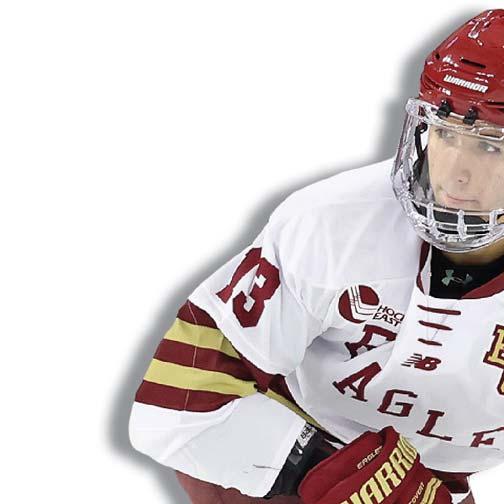
“He was like 5-foot-3,” York said with a grin.
Nesterenko was committed to Princeton at the time, but after three elite years of prep hockey, one year of dominant play in juniors, and with nearly another foot of height to his advantage, his college aspirations looked much different.
“Our assistant coach Brendan Buckely was out at BC junior league watching him play—there was a showcase in late September and he thought, ‘Well this is a completely different player than I saw three years ago,’” York said. “He just sprouted up.”
That growth spurt has worked out quite well for both parties. Nesterenko made an instant impact in his first year on the Heights, leading all Hockey East freshmen with seven goals and 11 assists for 18 points during the regular season. The Eagles tended to go as Nesterenko went. In the 14 games where Nesterenko notched at least one point, BC went 12–2–0.
His early contributions earned him the title of co-Hockey East Rookie of the Year alongside Josh Lopina of UMass.
Despite
Nesterenko’s strong season and the dynamic play of a host of other BC stars, including several who are already making names for themselves in the NHL, last season did not end as intended for the program.
First, BC crashed out of the Hockey East Tournament in the second round after blowing a 3–0 second-period lead to UMass Lowell. Then, after moving to the regional finals of the NCAA Tournament due to a COVID-19 forfeiture by Notre Dame, the Eagles again blew an early lead to fall 4–1 to St. Cloud State.
It was a disappointing end to a stellar year for a BC team stocked with NHL talent, as well as personally for Nesterenko, who did not register a point in either of BC’s postseason losses. But despite the losses of top players such as Matt Boldy, Alex Newhook, and Spencer Knight, BC returns plenty of talent for another run.
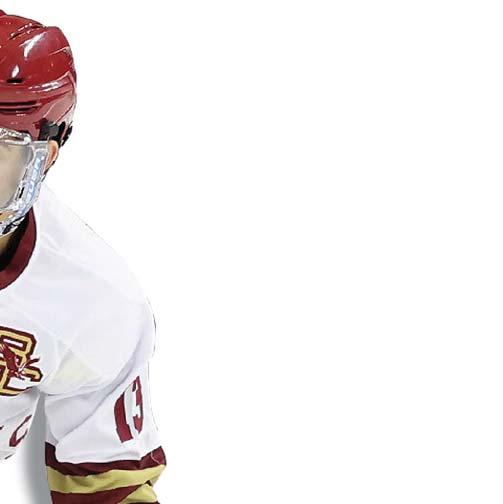
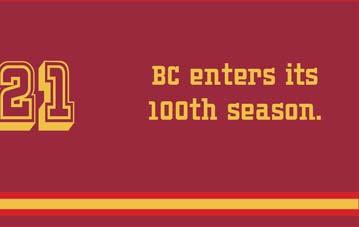
Longtime contributors Jack McBain and Marc McLaughlin headline the senior
This year’s group has an added bonus: the chance to celebrate the program’s 100th season with a title.

“I know that’s what I’m looking forward to,” Nesterenko said. “Win. That’s what all the guys have on their mind, so I think if we can just take all [the centennial] in and win a National Championship with that, I think that’ll be extra special.”
Early returns have been promising. The Eagles easily dispatched American International College (AIC) by a 4–1 margin in the season-opening exhibition, and Nesterenko provided one of the goals off a silky lift into the top left of the net to give BC a three-goal cushion.

“I thought we played great,” Nesterenko said. “Obviously it was a lot of people’s first game, but I thought we all bought in. We added a lot of experience this year, which I think is one thing that we were missing last year.”
For Nesterenko, claiming that National Championship in the centennial would be the ultimate testament to the winning tradition that originally brought him to BC.
“That [tradition] was probably the main decision for me, because you’re seeing all these players come through BC and then obviously going to play in the NHL and do great things there,” Nesterenko said. “Then hopefully [I’ll be] another one of those players that they’re able to develop.”
Though Nesterenko’s development on the Heights will steer his NHL prospects, his ambitions already have a target, as the Minnesota Wild drafted him in the sixth round of the 2019 NHL Draft.
Should he make it to the
leadership and guide a program joined by several highly touted freshmen and a group of graduate transfers. The talent is present, and as is always true for a program of BC’s caliber, the goal is to claim a National Championship.
show, he will be in good company with former Eagles. Boldy was selected in the first round by the Wild in 2019 and joined its AHL affiliate for 14 games last season after closing out his BC career. Boldy showed out in his brief stint, totaling 18 points and a series of highlight plays, and
he seems poised to make the roster for this upcoming NHL season.

“We haven’t talked about [playing together] much but it’s been on my mind,” Nesterenko said.
example of the way that COVID-19 harmed the normal flow of athletics last season, even beyond the clear examples of cancellations and player absences.
“I know he’s over there now. He’s doing great, I’ve watched a couple of his games. He’s an unbelievable player and he’s gonna play a lot of years in the NHL.”
Wild General Manager Bill Guerin is also a former Eagle, having skated on the Heights between 1989 and 1991, and Nesterenko’s current teammate Marshall Warren was also a Wild selection in the 2019 Draft.
York is not shy in pointing out the ways that Nesterenko can improve on his stellar freshman year season going into this year’s campaign. Despite the growth spurt that turned him from a talentedbut-too-small high school prospect to a college star, York would love to see more physicality in Nesterenko’s game.
“We’ve got a lot of players that are older, that are more physical than Nikita, that he’s probably trying to emulate,” York said. “He’s one of many keys that we have for our season, but surely he looks up to McBain, McLaughlin, players of that caliber.”
Off the ice, York’s relationship with Nesterenko is a good




“I’m just getting to know him because last year was such a hard year, [so] we really couldn’t have any interaction with players,” York said. “He seemed like a really nice young guy, but last year we could hardly sit down with any players.”
Even with that contact possible this year, Nesterenko and York’s ability to build a personal relationship, as well as Nesterenko’s season preparation, was hindered by COVID-19 once again.
Nesterenko tested positive for COVID-19 just before training started and missed most of the camp, although he returned for the last couple days prior to BC’s exhibition against AIC and looked smooth making the adjustment.
“He spent 10 days in Shawshank,” York said.
So far this year, York said he likes what he sees in Nesterenko’s continuing work to bring more physicality to his play.
“[He] looks like he’s stronger, looks like he’s more confident than he was at this time last year, so we expect him to be one of our top-end offensive players this year,” York said.
“{HE} LOOKS LIKE HE’S STRONGER STRONGER, LOOKS LIKE HE’S MORE CONFIDENT THAN HE WAS AT THIS TIME LAST YEAR.” — Jerry York after being named Co-Hockey East Rookie of the Year for the 2020–21 season, Nikita Nesterenko has only one direction to go: up.
Even THE HEIGHTS | OCT. 12, 2021 100 SEASONS | NIKITA NESTERENKO 7
























































































































